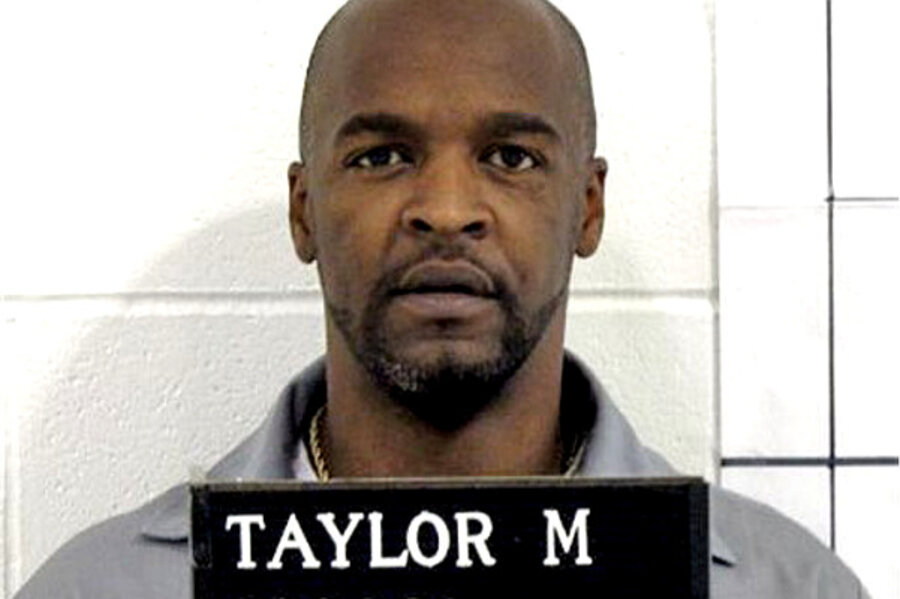What's behind the growing shortage of lethal-execution drugs?
Loading...
| ST. LOUIS
The nation's shortage of execution drugs is becoming increasingly acute as more pharmacies conclude that supplying the lethal chemicals is not worth the bad publicity and the legal and ethical risks.
The scarcity of drugs for lethal injections has forced states to scramble for substitutes. And experts say that whatever alternatives are found will almost certainly face costly court challenges made more complicated by laws that cloak the process in secrecy.
On Monday, the Tulsa, Okla.-based compounding pharmacy the Apothecary Shoppe agreed to stop selling pentobarbital to the Missouri Department of Corrections after the pharmacy was named in a lawsuit filed by death row inmate Michael Taylor alleging that the drug could cause "inhumane pain."
Missouri previously paid $8,000 in cash for each dose of the drug. The settlement will probably mean changing delicate execution procedures just a week before Taylor is scheduled to die for raping and killing a 15-year-old Kansas City girl in 1989. Gov. Jay Nixon said Tuesday that Missouri is prepared to carry out the Feb. 26 execution but declined to elaborate.
Messages left with spokesmen for the corrections department were not returned. The Apothecary Shoppe declined interview requests or to answer emailed questions.
Missouri, like many states, is reluctant to divulge much information about how, or where, it obtains lethal injection drugs, citing the privacy rights of the supplier.
Lethal injection has faced increasing scrutiny over the past decade. Major drug makers, many of them based in Europe with longtime opposition to the death penalty, have stopped selling to prisons and corrections departments. The source of the drugs is moving to the forefront of the death penalty debate.
Compounding pharmacies — which custom-mix prescription drugs for doctors and patients — seemed like the answer. They are generally overseen by state boards, not the U.S. Food and Drug Administration, although a law adopted last year allows larger compounding pharmacies to register with the FDA and submit to federal inspections.
But now, some compounding pharmacies are starting to back away, too.
Experts say they're not surprised, given the limited profit in selling execution drugs, ethical concerns in the medical profession, potential legal costs and unwanted publicity.
"This is not a good business model for compounding pharmacies, to be making drugs for executions, particularly with all the secret ways they're doing it," Fordam Law School professor Deborah Denno said.
Richard Dieter, executive director of the Washington-based Death Penalty Information Center, agreed.
"I'm sure they've never had such publicity," Dieter said. "They must be wondering what they got themselves into."
In Texas, the nation's most active death-penalty state, where 510 lethal injections have been carried out since 1982, the supply of pentobarbital may be running low.
After Woodlands Compounding Pharmacy near Houston was revealed in October as the supplier for Texas, the pharmacy asked the state Department of Criminal Justice to return unused vials. The state refused to do so.
The state's existing supply expires April 1. Texas has two executions scheduled for March and five others after the expiration date.
Texas Department of Criminal Justice spokesman Jason Clark said in a statement last week that the agency "continues to explore all options, including the continued use of pentobarbital or an alternate drug(s) in the lethal injection process."
The Woodlands pharmacy did not respond to a message seeking comment.
Ohio's lethal injection policy, like those in Missouri and Texas, calls for a single dose of pentobarbital. The state was unable to obtain pentobarbital for the past two executions, instead using a backup, two-drug combination of the sedative midazolam and the painkiller hydromorphone.
That combination was used to kill Dennis McGuire on Jan. 16 in an execution that raised new concerns. McGuire took 26 minutes to die, snorting, gasping and repeatedly opening and shutting his mouth as the drugs took effect.
Despite the concerns in Ohio, Missouri may be going to a similar backup plan.
A top corrections official, Dave Dormire, said last month in a deposition that Missouri has obtained midazolam and hydromorphone. The state revised its execution protocol to allow a combination of those two drugs to be used if "the department director determines that a sufficient quantity of pentobarbital is not available, or at any time the available pentobarbital is deemed unusable."
Taylor's legal team asked the U.S. District Court in Kansas City for a stay of execution Tuesday, citing concerns that the two-drug combination, never used in Missouri, could cause pain and suffering for the inmate. Messages left with attorneys John Simon and Matt Larson were not returned.
Some death-penalty states are well-stocked. Mississippi has not executed a prisoner since June 2012, but the state has an adequate supply of execution drugs, spokeswoman Tara Booth said.
Oklahoma uses a three-drug combination of pentobarbital, vecuronium bromide and potassium chloride. The state has "plenty" of each of the drugs, including 10 doses of pentobarbital, according to Oklahoma Department of Corrections spokesman Jerry Massie.
The state will have "no problem" finding new stock when that supply runs low, Massie said, though he did not elaborate.
Like Missouri, Texas and other states, Oklahoma does not disclose the source of its drugs.
Dieter said most states will struggle to find drugs for executions.
"That is going to continue to be a conflict," he said. "There's no nice way to kill people, and this is part of that dilemma that the death penalty presents."
Associated Press writers Andrew Welsh-Huggins in Columbus, Ohio; Michael Graczyk in Houston; Justin Juozapavicius in Tulsa, Okla.; Jack Elliott in Jackson, Miss.; and David A. Lieb in Jefferson City, Mo., contributed to this report.
Copyright 2014 The Associated Press. All rights reserved. This material may not be published, broadcast, rewritten or redistributed.







